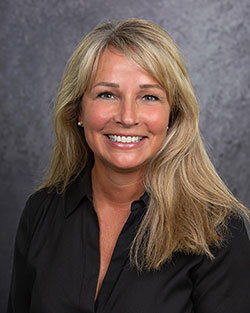AVMA Editor-In-Chief Lisa Fortier is one of four equine veterinarians who have been inducted this year into the Equine Research Hall of Fame. Established by the University of Kentucky Equine Research Foundation—now the UK Gluck Equine Research Foundation—the Hall of Fame honors those distinguished researchers who have dedicated their careers to equine science.
Along with Dr. Fortier, the other inductees are Drs. Katrin Hinrichs, Jennifer Anne Mumford, and Stephen M. Reed.
“The success of Kentucky’s horse industry is inseparable from the decades of hard work by outstanding equine researchers,” said Dr. Stuart Brown, chair of the Gluck Equine Research Foundation, in a Sept. 14 announcement. “Though impossible to measure, it is a unique privilege to recognize the impact made by these four scientists in advancing the health and wellbeing of the horse and, on behalf of the entire equine community, show our appreciation.”

Dr. Fortier became editor-in-chief of the AVMA journals and director of the AVMA Publications Division in June 2021. She also holds the title of James Law professor of surgery at Cornell University College of Veterinary Medicine. In addition, Dr. Fortier serves on the Horseracing Integrity and Safety Authority’s Racetrack Safety Standing Committee.
Over the past 30 years, Dr. Fortier has garnered an international reputation for significant contributions in equine joint disease, cartilage biology, and regenerative medicine, according to the announcement. She has focused her research on early diagnosis and treatment of equine orthopedic injuries to prevent permanent damage to joints and tendons. She is perhaps best known for her work in regenerative medicine, pioneering the use of biologics such as platelet-rich plasma, bone marrow concentrate, and stem cells for use in horses and humans. Dr. Fortier’s lab has also been instrumental in breakthroughs related to diagnosis of cartilage damage and clinical orthopedic work.
Previously, Dr. Fortier held the title of editor-in-chief of the Journal of Cartilage and Joint Preservation. She received her veterinary degree from Colorado State University in 1991, then completed an internship in equine surgery at Illinois Equine Hospital. She completed a surgical residency and a PhD in veterinary medicine at Cornell University. Dr. Fortier is a diplomate of the American College of Veterinary Surgeons.
“I am deeply honored to have been selected for this international award. I couldn’t have done it without the support of my three wonderful children, friends, and colleagues—and, of course, the horses,” Dr. Fortier said.

Dr. Hinrichs has devoted her career to research in equine reproductive physiology and assisted reproduction techniques. Specifically, her focus has included equine endocrinology, oocyte maturation, fertilization, sperm capacitation, and the application of these to assisted reproduction techniques. Her work has resulted in producing the first cloned horse in North America and developing the medical standard for effective intracytoplasmic sperm injection and in vitro culture for embryo production in horses, the announcement states.
Dr. Hinrichs earned her veterinary degree in 1978 from the University of California-Davis. She completed residency training in large animal reproduction at the University of Pennsylvania’s New Bolton Center and earned a PhD in the Biomedical Graduate Group at the University of Pennsylvania. She is a diplomate of the American College of Theriogenologists.

A posthumous inductee, Dr. Mumford earned international recognition for her research on the leading causes of acute infectious respiratory disease in horses, including equine herpesvirus and equine influenza virus and, to a lesser extent, Streptococcus equi.
Dr. Mumford made numerous significant contributions in these areas, according to the announcement, including developing improved vaccines, diagnostics, and international surveillance. She also helped establish research groups in the related fields of equine genetics and immunology.
Dr. Mumford earned her veterinary degree and a PhD on bacteriophages from the University of Nottingham. During her career of more than 30 years, she established the Animal Health Trust in Newmarket, England, as one of the world’s leading centers for the study of the biology, epidemiology, immunology, and pathology of diseases, including equine herpesvirus and equine influenza, as well as bacterial diseases, including Streptococcus and Clostridium infection. She died in September 2019.

Dr. Reed is widely recognized as one of the most prominent equine neurologists. His list of 180 peer-reviewed publications includes significant contributions to equine medicine, neurology, physiology, and pathophysiology.
A diplomate of the American College of Veterinary Internal Medicine, he has written and spoken extensively on wobbler syndrome, equine protozoal myelitis, head trauma, and neurologic examinations.
Dr. Reed earned his veterinary degree in 1976 from The Ohio State University. He completed internship and residency training in large animal medicine at Michigan State University.
Hall of Fame
The Equine Research Hall of Fame provides a lasting tribute to the most renowned equine researchers in a variety of disciplines and serves as an international forum for honoring outstanding achievements in equine research. The first class of 12 scientists was inducted in December 1990, and there are currently less than 40 total inductees.
Inductees are selected for the honor by an international scientific committee that evaluates the achievements and contributions of eminent researchers who were nominated by their peers and colleagues. The inductees—active, retired or deceased—are individuals from throughout the world who have expanded the body of knowledge of equine science through their contributions to basic or applied research.
The 2022 class will be inducted on Oct. 26 at Kroger Field on the University of Kentucky’s Lexington campus. More information is available at gluck.ca.uky.edu/fame.
